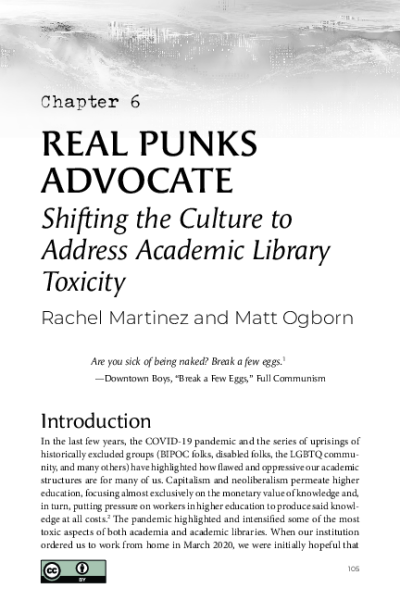Filtering by
- All Subjects: Academic libraries
- All Subjects: Dissertations, Academic
- All Subjects: Electronic dissertations

The panel discusses and elucidate components of a student-to-student peer program and cover comprehensive planning aspects of personnel, communication and workflow methodologies, interdisciplinary representation, and competency building activities. They will share training and work protocols, focusing on the evolution of the program from conceptualization through implementation. The presentation is an interactive conversation between the panelists (covering varying aspects and perspectives of the program) and the audience.

Getting to the Core of Services: Considering the Arizona State University Library as a Core Facility

The Simon Ortiz and Labriola Center Lecture on Indigenous Land, Culture, and Community addresses topics and issues across disciplines in the arts, humanities, sciences, and politics. Underscoring Indigenous American experiences and perspectives, this Series seeks to create and celebrate knowledge that evolves from an Indigenous worldview that is inclusive and that is applicable to all walks of life.” Professor Simon Ortiz discussed the overall nature of the Series, especially emphasizing the global nature of Indigenous concerns. Joyce Martin and Matthew Harp elaborated on the contributions of the Labriola National American Indian Data Center and ASU Libraries to the Series.
The Labriola Center hosts an informal event in Hayden Library which facilitates close interaction between the featured speaker and audience members. The ASU Libraries records the evening lectures which take place at the Heard Museum and presents both an audio podcast and streaming video of each lecture on the ASU Library Channel webpage. This lecture series provides not only a chance for community discussion at the events themselves, but through the innovative use of technology the ASU Libraries enables additional forums for discussion in blogs and web pages which choose to link to the streaming videos.



Chapter from the ACRL book Toxic Dynamics: Disrupting, Dismantling, and Transforming Academic Library Culture. This chapter provides a bit of background on punk and libraries, identifies some toxic library cultures, and then suggests concrete ways for library workers to disrupt these cultures while maintaining boundaries that are regularly violated in library work.

Videos are a useful and popular way to reach an audience — we all know videos that have gone viral online, garnering millions of views. However, the type of video that can compete with Old Spice commercials takes weeks to plan and produce, as well as a significant budget. Arizona State University (ASU) Libraries wanted to find a sustainable way to share videos that would require minimal staff time to create and produce.
With that goal in mind, “The Library Minute” was born. We initially envisioned a weekly newscast, but it has evolved into a successful and fun video series. Episodes have been featured in American Libraries Direct, as part of the ACRL Marketing Minute, received more than 74,000 views on YouTube and the Internet Archive, and have garnered complimentary e-mails from all over the world. Most importantly, they are a valuable marketing and outreach tool for the ASU Libraries and have increased our visibility to our students and other departments in the university.

Purpose: In spring of 2007, Arizona State University Libraries held a focus group of selected faculty to discover their perceptions and use of electronic books (e-books) in their research and teaching.
Methodology/approach: We employed the services of the Institute of Social Sciences Research to recruit and moderate the focus group. The following major themes were explored:
1) Use of e-books as textbooks.
2) Use of e-books for personal research.
3) Comparison between e-books and print.
4) Disciplinary differences in perceptions of e-books.
5) Motivators for future use
Findings: Overall, the focus group revealed that faculty had generally unsatisfactory experiences in using e-books in their research and teaching due to the unreliability of access, lack of manipulability, and the steep learning curve of the various interfaces. However, most faculty agreed that e-books would be a very viable and useful alternative if these issues were resolved.
Research limitations/implications: The focus group consisted of only six faculty members and hence is not representative of faculty as a whole. A larger survey of a more diverse faculty population would greatly serve to clarify and expand upon our findings.
Practical implications: The implications for academic libraries include providing better outreach and training to faculty about the e-book platforms offered, provide better course support, and advocate to e-book vendors to consider faculty's teaching and research needs in their product development.
Originality/value of paper: To the best knowledge of the authors, this is the first published study of faculty opinions and use of e-books utilizing focus group methodology and offers detailed information that would be useful for academic libraries and e-book vendors for evidence-based decisions.

Arizona State University (ASU) is known for both enormous size and scale, as well as excellence in research and innovation. These attributes are embodied in the ideal of the “New American University.” ASU Library, as a partner in the New American University, has reorganized itself, completed a large-scale renovation of its main library building, and created interdisciplinary divisions of librarians and other professionals, backed up by subject “knowledge teams” that address specific research needs of faculty and students. As a result, the library has become involved in nontraditional projects across the university. This article is useful for libraries seeking to remain relevant and align themselves with institutional priorities.

